PART ONE: The Biter Bit
A NATION never so divided, a world turned upside down, we’re all going to hell in a handcart.
Well, maybe.
It refers to a world turned upside down, where the old certainties have evaporated
In the quire at Manchester Cathedral there is a carving which dates from between 1500 and 1506. It depict rabbits cooking the hunter.
Although damaged it’s an entertaining piece: the hunter hunted and caught then tied to a spit while his hounds have been stuffed into pots. A rabbit stands over them, his paw turning the pages of the oldest cookery book in Manchester’s history or maybe he’s reaching for the spices. The rabbit looks a bit like Paul Hollywood.
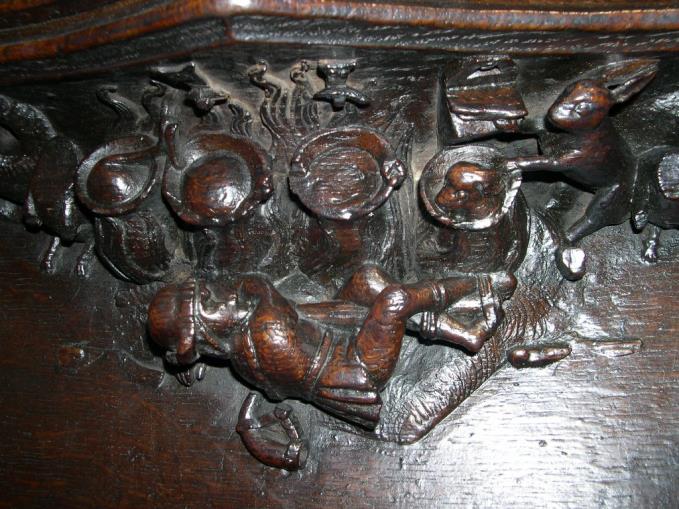 The rabbits look like they're going to get a good meal
The rabbits look like they're going to get a good mealThe simple but troubling scene contains a deeper meaning. It refers to a world turned upside down, where the old certainties have evaporated and the established order of life has been destroyed. It refers to revolution. The downtrodden and preyed upon, the rabble, not the rabbits, the uneducated and illiterate are in control of Church and State and all is chaos and bloodshed and blind stupidity.
In what spirit the Roman Catholic hierarchy of Manchester had this image carved is unknown, maybe they were afraid of trouble ahead or maybe they thought it was just a piece of whimsical nonsense, a good laugh on a wet winter’s day.
But they should have been worried. Within forty years there was no Roman Catholic hierarchy in Britain. The Pope had been ousted, Good King Hal (depending on your point of view) had taken the Vicar of Rome's place. The priesthood who commissioned this little Manchester scene of rabbits cooking the hunter found their world had indeed turned upside down. They were hunted men.
People I know, probably people we all know, protesters in American cities, many people who voted for Brexit and Trump and many people who didn’t, seem to feel we have reached a similar moment. One German paper even spelt it out and made a headline of the world turned upside down.
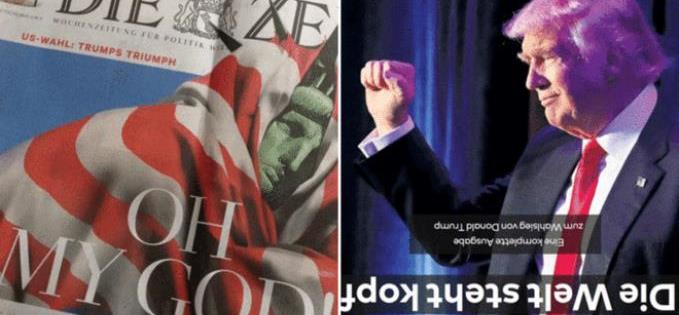 It's the wrong way around
It's the wrong way aroundPART TWO: Echoes and Cycles
BUT are we living in unique times?
That marked a sea-change in Manchester and now the radicals and the reformers were in the ascendency
Well maybe, but let's remember Manchester, England, the UK has always been a divided nation, it’s merely in the degree of division that the situation changes.
From a Manchester perspective where do we start?
It could be with the English Civil Wars when Manchester was Parliamentarian while much of the rest of Lancashire was Royalist. Parliament won, of course, the more progressive party one might say, than the old-fashioned Royalists.
Or maybe we could start with the split in the country and in the town between those who supported the old Stuart kings and their post William of Orange replacements, the Hanoverians. This culminated in bloodshed in 1715 and a lot more bloodshed in 1745/6 with open war. Ten Manchester men were hanged, drawn and quartered for siding with the rebels as the Stuart cause was defeated.
Better echoes of present troubles start in the late eighteenth century with the Church and King Riots. Progressives such as Thomas Walker stirred by the ideal of equality for all men embodied in Thomas Paine's Rights of Man and the American and French Revolutions, started to agitate for Parliamentary reform. They even set up their own paper the Manchester Herald. Similarly Manchester was a centre of non-conformism. This powerful city group were denied civil rights (along with Roman Catholics) and thus were naturally political radicals and allies of Walker.
On the other side were the Tories who believed they defended sacred British traditions, in other words they thought Walker was wrong. They set up the Church and King Club and engineered mobs in 1792, fuelled by free alcohol and patriotic rhetoric, to burn down chapels, wreck the Herald's offices and beseige Walker in his own house for three days. Much of the rhetoric concerned the danger from foreigners and Papists. The magistrates and constables stood by and watched.
In 1812 during another moment of distress a meeting convened at the Exchange to celebrate the return of another Tory government was cancelled as the reforming party occupied the building which was badly damaged. That marked a sea-change in Manchester and now the radicals and the reformers were in the ascendency. John Bright, a Liberal MP, would say after an election in the 1830s that if he could find a real Conservative working man in Manchester he’d put him under a glass case.
The Exchange riot established the battle ground in Manchester. On the one side were those who desired representation in Parliament, a city corporation decided through the ballot box, religious equality (ultimately sexual equality), an end to slavery in all parts of the ex-British Empire and across the sea in the USA. On the other side were those who wished to maintain the status quo, often violently, with little idea why, controlled by property interests who found change difficult. This isn't a socialist thesis, it's the fact of the matter in the 19th century.
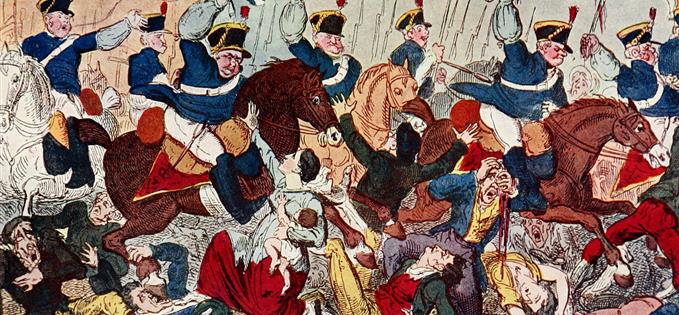 The Peterloo Massacre in which 15 were killed by local yeomanry during a peaceful protest over a lack of the vote and Parliamentary representation
The Peterloo Massacre in which 15 were killed by local yeomanry during a peaceful protest over a lack of the vote and Parliamentary representationFrom this division in a divided country came Peterloo, the civic incorporation movement, the Anti-Corn Law League which became the Free Trade Movement, the Chartists, the Anti-Slavery Movement, the TUC, the votes for women cause (including the Suffragettes) and so on and so on.
At every step these ideas were parried to greater or lesser effect by the forces of reaction. For instance, when Manchester's MP John Bright fiercely opposed the Crimean War as unjust and pointless in the 1850s he paid for it with his seat.
So while Manchester retained a generally progressive character there was also a deeply reactionary tradition in the city. In 1872 Benjamim Disreali, the Prime Minister, visited Manchester, and as a contemporary report reveals, 'he received addresses from 124 Lancashire Conservative, Constitutional and Orange Associations'. At Pomona, where he spoke, it was 'estimated that the number in the great hall was 30,000, with 15,000 more in the open air'.
The story continued in the 20th century although the city, as its relative wealth diminished, was rarely so centre-stage. Still events such as the Mass Trespass on Kinder Scout in the 1930s and protests against Clause 28 in the 1980s, along with numerous other rallies and campaigns still revealed a progressive undercurrent in Manchester's affairs. But it has always been challenged either directly or by indifference or apathy.
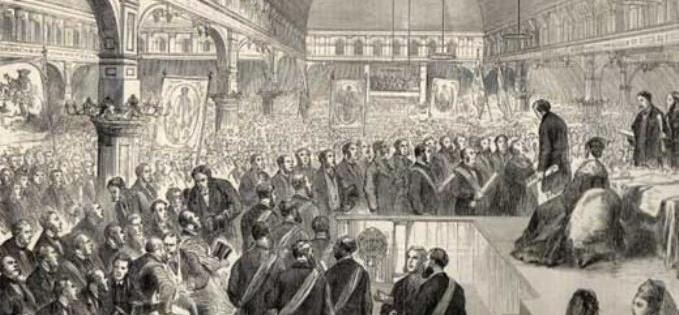 Disraeli at the Pomona meeting
Disraeli at the Pomona meetingPART THREE: Comparisons and Concerns
SO WHAT conclusions can be made?
The recent Brexit vote and the Trump election comes from a different direction, a closing down and narrowing of the aspiration for fairness for all
The protests in much of the nineteenth century concerned hunger, a desire for representative government and respite from crushing labour conditions combined with fear of ill-health and unemployment leading to the workhouse and the break-up of the family.
Not all as we have seen, but much of the agitation for action was about making the world a fairer, a more equal place, about winning rights.
The recent Brexit vote and the Trump election comes from a different direction, a closing down and narrowing of the aspiration for fairness for all (particularly immigrants), couched in terms of a new global reality which puts the UK and the US at breaking point from often external causes.
The problem is that much of the rhetoric behind these recent events comes, as with that of the Church and King Club, from suspicion and fear. The problem is that much of it is simply disguised racism revolving around the subject of immigration.
Of course this has always been the case. But not since the 1930s has the base instinct been supported by mainstream media with The Daily Mail, which wrote articles praising Hitler and Oswald Mosley's British black shirts back then, merely the worst example.
But in 2016 there is a new element to all this.
A key difference between the actions of groups such as the Chartists and the Suffragettes is that they had some form of leadership, and some loose structure. Now, the babble of social media allows people to get angry, and within the ravenous maw of the internet stay angry without leadership or much direction. This inchoate rage is often strung around ill-thought through, untested clichés such as ‘All politicians are in it for themselves’. That statement can be disproved in a nano-second but also lacks self-awareness, given that most people in any job are, to greater or lesser extent, in it for themselves. Not least, the internet strange ones who realise they don't have to have any knowledge of a situation to get their own private airtime and be endorsed by other uneducated and ill-informed ranters.
In the same year as Chartist riots in Manchester, 1842, one of the twin fathers of Communism arrived in Manchester, the 20-year-old Friedrich Engels. He’d stay, on and off, for almost 22 years. Before he'd almost put down his suitcases he wrote: ‘At first one cannot get over one’s surprise at hearing in the Hall of Science (close to where the Museum of Science and Industry presently stands) the most ordinary workers speaking with a clear understanding on political, religious and social affairs..…I saw the hall, which holds about 3,000, crowded every Sunday.’
Today it seems millions on both sides of the Brexit and Trump votes crowd onto social media and smashing their keyboards into submission demonstrate no clear understanding of political, religious and social affairs. Or manners. Nor do they want to. These howling millions, found focus in the European Referendum and the US Election.
In another historical parallel, this ‘rage’ has been encouraged by a return to eighteenth and early nineteenth century political canvassing. Instead of rabble-rousing demogogues, some politicians have used the media to ditch restraint and decency and have simply lied, desperate to grab hold of part of that incoherent anger.
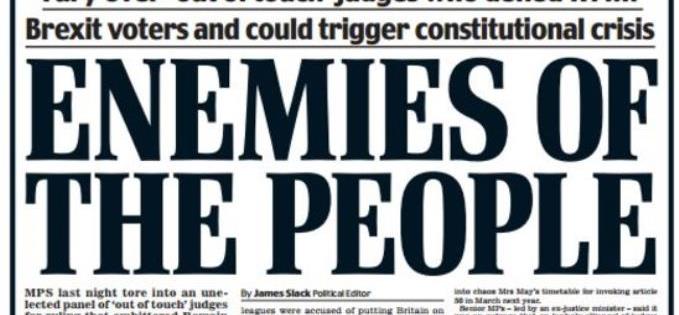 Headline from the Daily Mail on 4 November
Headline from the Daily Mail on 4 NovemberNewspapers have done the same and told quite deliberate lies themselves (again a common 18th century tactic) or gone for pure provocation. The Daily Mail outdid itself when it plumbed the absolute depths with an attack on the democratic doctrine of the separation of powers (independent executive, legislature and judiciary all checking up on each other) and called UK judges ‘Enemies of the People.’ We can forget 'the comment is free, facts are sacred' mantra of the Manchester Guardian's C. P. Scott. Now, a panicking Fourth Estate, in an uncertain media landscape, follows the shifting sands of trends on Twitter and rather than creating edited and measured responses to upheaval, they follow it.
But we can comfort ourselves that this is not a permanent situation. Progress will reassert itself, that is the lesson
Of course there are many Brexiteers and Trump supporters who had very clear reasons and a very great understanding of what they were doing. To demonise such people as racist or stupid, as some people have characterised them, is as ridiculous as statements such as ‘All politicians are in it for themselves.’ It's just the cycle has spun. We are in a phase where the mood is reactionary and encouraged by the tornado of social media, popularist politicians and elements of the mainstream media, people have decided to doubt the institutions that created their freedom of thought and conscience in the first place.
This is the sadness. Whereas over two centuries the UK and the USA, with occasional moments of doubt and backtracking, have moved towards more openness and more tolerance, suddenly both countries find that lies, a lack of leadership and a new technology that promised so much, has brought us to a narrowing of minds, a conservatism that overtly uses the language of rage and racism to justify its actions.
Precedent illustrates that in the democracies the cycle eventually spins the other way. Thus it is likely Trump will come up with a bump against his own Congress and House of Representatives plus the vast US civil service. Brexit has hit a High Court judgement stressing Parliamentary sovereignty and despite the government's appeal to the Supreme Court may have started the process of tempering 'hard Brexit'.
But at the moment progressives have cause to fear the world is turned upside down. The shades of doubt, fear, suspicion and racism, seem to be winning, the rabbits are in the kitchen. The idea of progress as a virtue is in retreat. Our Manchester forebears, who fought for rights and decent lives within a tolerant society would shake their heads. But we can comfort ourselves that this is not a permanent situation. Progress will reassert itself, that is the lesson. What goes around comes around. It always does.
 Powered by Wakelet
Powered by Wakelet














